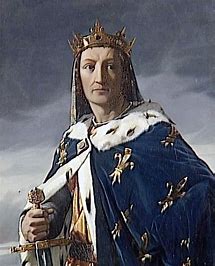
AUGUST 25 is the traditional feast day of ST. LOUIS, king of France (+1270). Here is the only King of France to ever be canonized.
Born 25 April, 1214, Louis was the son of Prince Louis “the Lion”, son of King Philip of France, and Blanche of Castile, daughter of King Alfonso of Castile. He was certainly of royal descent. At the age of nine, his grandfather died and his father became King Louis VIII. But that reign lasted only three years. Louis was knighted and crowned king at the age of twelve. Due to his youth, Blanche was regent until Louis’ twenty-first birthday. The Queen Regent did well. She taught her children to revere God’s words and to live as a Catholic.
Louis was known for his moderate lifestyle, his powers of reasoning, his bravery and his chivalrous politeness. He was known to be fair and of great moral integrity. As a matter of fact, he was often the arbiter of disputes involving other monarchs.
The reign of Louis IX was said to be the medieval golden age of economics and politics. The country was impressive for its wealth and military pre-eminence. The arts and crafts of Paris were marketed throughout Europe. The architecture of Paris took on a specific look, leading to the Gothic architecture of the next few centuries.
King Louis was a reformer and developer of the French royal justice. He saw himself as the supreme judge to whom anyone could appeal to seek amendment of a judgement. He barred trials by ordeal, claiming them to be out of date. He developed the legal notion of “presumption of innocence” To carry out this new legal system, he created provosts and bailiffs. He even tried to prevent private wars between the nobles of France, with limited results.
In keeping with his Catholic view, Louis created innumerable charitable acts. Over 100 beggars ate at his table, as he washed their feet. He ministered to lepers, a group who were avoided by all. He founded a home for reformed prostitutes, built a home for 300 blind men and established hospitals in various towns. At his estate of Fountainebleau, he installed a house for the Trinitarian Order.
At a relatively young age, ill with a serious disease, the king vowed to join the defense against the caliphates should he recover. [Note: the word ‘Crusades’ was not used until the 16th century] His chance came in 1248, when the current pope asked for another try at defense. King Louis gathered an army and they moved on Egypt, where, due to various poor choices in strategy, the army was routed and the king captured. He had to ransom his way out. The remaining army went to the Holy Land, spending time and money building up defenses and conducting diplomacy with the Islamic powers of Syria and Egypt. During this time, he also had a series of diplomatic discussions with ambassadors from Mongolia, which never produced any solid results, but shows his wide-spread influence. He returned home in 1254.
In 1267, Louis and his three sons “took the cross” at Paris, preliminary to going abroad, again. They headed for Tunis, where they landed in 1270. The camps were not hygienic and disease broke out. The king died of dysentery August 25, 1270.
King Louis had a close friend and confidant, Jean de Joinville, who went through much of life with the king. He wrote a biography and testified for his friend during the papal inquest which ended in the canonization of King Louis in 1297. We are lucky to have a first hand account of this great man’s life.
“If God sends you tribulation, you ought to endure it, giving thanks, realizing that it is for your good, and that, perhaps, you have deserved it. If however the Lord confers some benefit on you, you must humbly thank Him, and be on your guard not to become the worse for it, either through vainglory or in any other way. You must not offend God with the very gifts He has given you.”
Advice to son Philip


Recent Comments